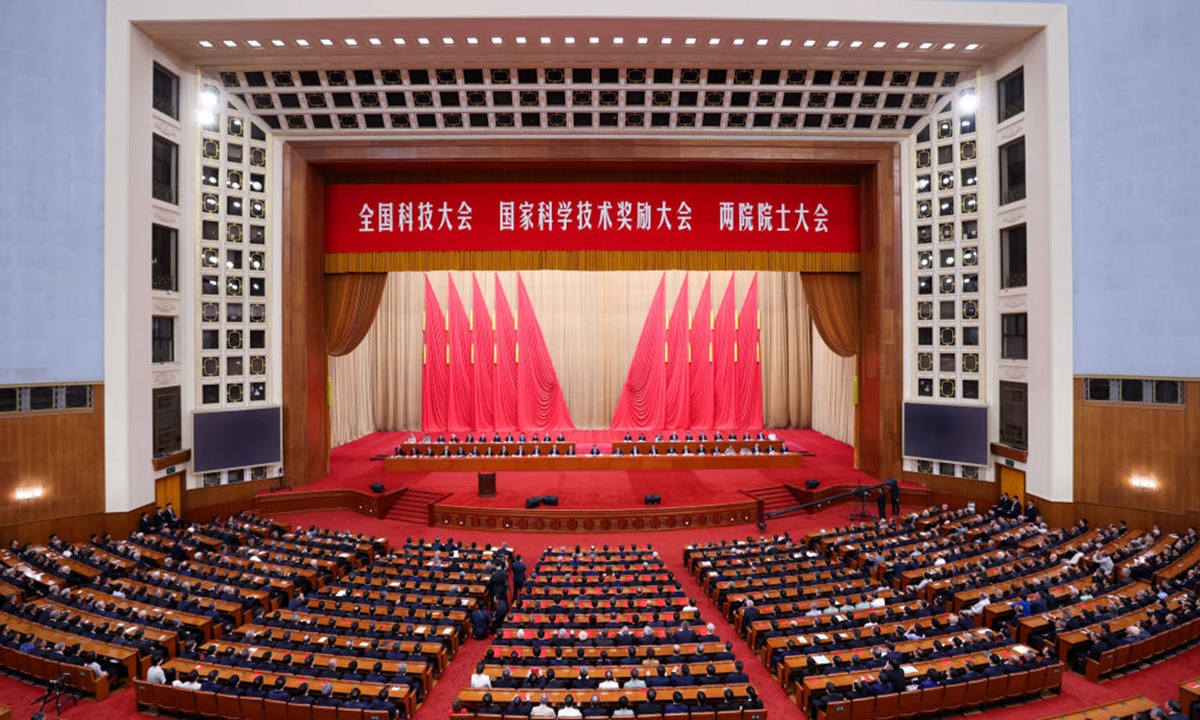China's top science awards issued, epitome of country's phased achievements in innovation-driven development

China's highest science and technology awards are announced in Beijing on June 24, 2024, with two scientists, Li Deren and Xue Qikun, winning the national top sci-tech award for the year 2023. Photo: Xinhua
After a two-year hiatus, the country's highest science and technology awards were announced in Beijing, with two scientists, Li Deren and Xue Qikun, winning the national top sci-tech award for the year 2023.
The awards are an important basic system to which China has long adhered to encourage basic scientific and technological innovation. The newly-issued awards are an epitome of the country's phased achievements in innovation-driven development, analysts said.
Chinese President Xi Jinping on Monday underscored the importance of sci-tech modernization and innovation in pursuing Chinese modernization and high-quality development.
Xi, also general secretary of the Communist Party of China Central Committee and chairman of the Central Military Commission, presented China's top sci-tech award and made the remarks at the national sci-tech conference.
Li is a renowned photogrammetry and remote sensing expert, while Xue is a prominent scientist in the field of condensed matter physics.
Li, 84, has been dedicated to improving China's surveying and remote sensing capabilities. He has successfully developed core technologies for global high-precision positioning and mapping using satellite remote sensing technology, solving a series of challenges in the high-precision processing of remote sensing satellite images.
China's satellite remote sensing has progressed "from nothing to something, and from something to excellence, achieving self-reliance and independence," Li, who was also named the ambassador of the Space Day of China 2024, told the Global Times in Wuhan in April, noting that as a teacher and academician engaged in space remote sensing applications, he was very pleased by the progress.
Although China started its space exploration missions 50 years later than the US, thanks to the country's superior system and the importance placed upon the missions by the central government, especially since the 18th CPC National Congress, China has launched major initiatives such as the Gaofen remote sensing project and the BeiDou Navigation Satellite System project. China's remote sensing technology serves the public and contributes to world peace, Li said.
According to Li, space exploration comprises three major missions: Earth observation, deep space exploration and space-borne research.
"Space exploration involves observing Earth through remote sensing, navigation, and communication technology. It serves sustainable development and humanity by helping us understand the natural environment, find resources, and respond to natural disasters," Li said.
Regarding deep space exploration, Li said, "We launch satellites into deep space to explore the solar system, study black holes, and investigate fundamental questions about the origins of the universe and humanity. China has sent robotic probes to the moon and Mars, and we will soon send crewed missions to the moon."
"Space-borne research involves establishing space stations to conduct in-orbit research, including studies on the origins of life," the senior expert noted.
Xue, 61, has achieved several groundbreaking scientific breakthroughs.
Xue led his team in the first experimental observation of the quantum anomalous Hall effect, which had significant international influence in academic circles. This major research achievement was praised by Nobel laureate Yang Chen-Ning as "the first Nobel Prize-level physics paper published from a Chinese laboratory."
Xue once said that discovering new scientific phenomena and laws is the shining pearl on the crown of basic research. "For a nation to be strong, we must certainly create things that are truly scientific discoveries in the world," he noted.
This year's national science and technology award fully reflects the country's emphasis on strengthening basic research and application of basic research, Chu Jianxun, a research expert on the national innovation ecosystem and professor at the University of Science and Technology of China, told the Global Times on Monday.
The awards selection is an epitome of the country's phased achievements in innovation-driven development.
"Our country's scientific research development has achieved high-level technological self-reliance in key core technology areas, with the strategic orientation toward developing the world's cutting-edge technologies, facing the economic main battlefield, the country's major needs, and the people's health," Chu explained.
Technological innovation has been applied to support high-quality development, ensure high-level security and nurture new quality productive forces, establishing a competitive and attractive innovation ecosystem globally, Chu noted.
This achievement could not have been achieved without the comprehensive design of the country. Some major topics from the perspective of national needs have been launched, resulting in a batch of top-notch domestic and even internationally leading important outcomes, the expert said.
Along with the two top sci-tech awards, research on the computational prediction of topological electronic materials and 48 other achievements were honored with a State Natural Science Award. Dozens of projects were also presented with the State Technological Invention Award. More than 100 projects were issued the State Scientific and Technological Progress Award, according to the Xinhua News Agency.
Notably, the field of basic research continues to yield significant breakthroughs, as evidenced by the national natural science award consecutively granting first prizes for nine years.
Young and middle-aged scientific talents have emerged as a crucial driving force in China's technological advancements, constituting around 40 percent of the recipients across the three major award categories.
In the national natural science award, individuals under the age of 45 represented over half of the awardees, showcasing the growing influence of the younger generation in shaping the country's scientific landscape.
According to data from the Ministry of Science and Technology, China's total number of R & D personnel ranks first in the world, young scientific and technological talents have become the main force of scientific research, with 80 percent of the National Natural Science Foundation projects being undertaken by young personnel under the age of 45.
The 2023 top science and technology award reemerged to the public eye after a two-year break, highlighting its stronger credibility as the top scientific award this year.
The nomination system for the award has been adjusted from the previous once a year to the current every two or three years, a Shanghai-based official on scientific award was quoted by Shangguan News.
This year's award is equivalent to the accumulation of three years of projects since there were no national science and technology awards in 2021 and 2022, making the difficulty of winning the award significantly higher than in the past.
"In the future, the competition for national science and technology awards will become increasingly fierce and the requirements will rise," the Shanghai-based official said.



